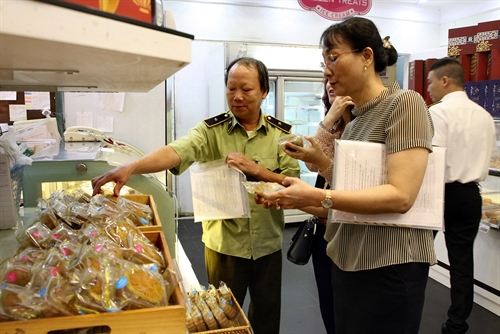 Society
Society

Home-made moon cakes have become a favourite choice for city people in Hà Nội due to its affordable prices and diverse flavours.
 |
| Inspectors check moon cakes’ quality at the An Hòa Bakery in Hà Nội’s Đống Đa District. Homemade moon cakes have become a favourite in the capital city. — VNA/VNS Photo Dương Ngọc |
HÀ NỘI — With affordable prices and diverse flavours, homemade moon cakes have become a favourite in the capital city.
As the mid-Autumn Festival approaches, online cake shops—run by small-scale producers—are booming, advertising their products with a wide range of flavours and fresh ingredients.
Many consumers have switched to to homemade sweets away from mass-produced products, calling the homemade goods more healthy, hygienic and safe.
Nguyễn Thu Trang, resident in Hà Nội’s Tôn Đức Thắng Street, said she no longer purchased the cakes from big companies, calling their flavours less delicious and fresh than the home-made ones.
“The expiry date of the mass-produced cakes last over a month, while the homemade that I’ve bought last only ten days. I was told that they have no preservatives or vacuum seal”.
“The taste of the cakes are totally different. They are sweet and small enough to enjoy the whole cake,” she said.
Moon cakes are a traditional treat for celebrants, especially children, during the fall celebration. Thus, she only bought cakes that were ensured the safety and hygiene criteria, she added.
However, not all home-made cakes are safe.
Nguyễn Thanh Phong, head of the Ministry of Health’s Food Safety and Hygiene Department, said that big enterprise moon cakes must be tested for quality and granted food safety certificates before being sold at the market.
In the meantime, most home-made products did not face regulation, posing risks for consumers’ health, he said.
Along Hàng Buồm Street, a street known for selling sweets, or Đồng Xuân and Hôm markets, raw materials for moon cakes of baked or sticky rice ones are available.
Tens of fillings, ranging from expensive ones—like fish fins and barbeque chicken—to the traditional bean paste, salted eggs, sausage, lotus seeds, and jam are displayed outdoor. Powder to make the cover of the cakes is put into a plastic bag without the labelling of origin, expiry dates or information on manufacturers.
A shop owner at Đồng Xuân Market said that raw materials are divided into small bags and are cheap and easy to sell.
Explaining the lack of labelling, she said raw materials were packed in big bags, and sellers usually divided them into small ones, thus were not labelled.
She added that all of her products were home-made, and they were just done to serve this moon festival. Thus, she maintained that everything was safe and fresh.
Under reporters’ observation, grinded lotus seed for the filling of cake is sold at VNĐ130,000 per kilo while raw dry seed is VNĐ100,000 ($4.3). The sausage is sold at VNĐ80,000 per kilo while pork is VNĐ90,000 ($3.9) per kilo. Each kilo can make between 20 and 30 cakes.
Vũ Thanh Thủy, deputy head of the market’s management board, said that traders only sold raw materials of moon cakes for some days before the moon festival.
The board has worked with the city’s market watch to disseminate traders information concerning the food safety and hygiene regulations and inspections, but she admitted that the task was still loose.
Nguyễn Văn Tiến, doctor at the National Institute of Nutrition, said that consumers could hardly tell whether the cakes were made from hygienic materials or not. It could bring risks of food poison for consumers without having signs.
He suggested that consumers should carefully choose home-made cakes to assure their safety. Any products, traditionally or industrially-made, must have proper labelling as required. — VNS




